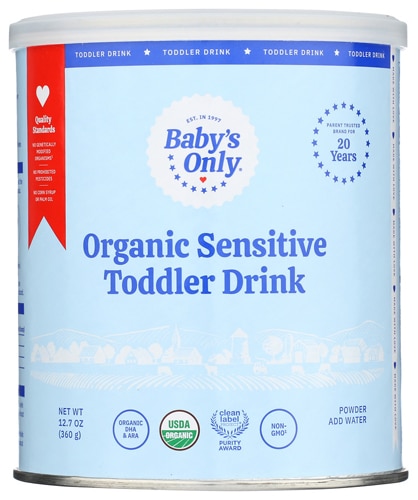[vc_row][vc_column][vc_column_text]In early 2022, Abbott Nutrition recalled certain Similac, Alimentum and EleCare powdered infant formulas produced at its factory in Michigan. The recall followed reports of bacterial infections (including two deaths) in babies who had been fed these brands of formula.
While this was a relatively isolated incident, it does raise questions and concerns about the formula we feed our babies. In light of the recall, what should parents do to prevent their formula-fed babies from being harmed? And should parents use formula to begin with?
The answers to those questions are multifaceted, but everything boils down to this: Educate yourself about baby formulas that are on the market before making a purchase. “No brand of infant formula is best for all babies,” the U.S. Centers for Disease Control and Prevention (CDC)
notes.

Choosing the Best Baby Formula for Your Child
- Check the label on the formula to see whether the expiration date has passed. If the formula is expired, don’t feed it to your baby.
- Make sure the container is sealed and in good condition. If there are any leaks, puffy ends or rust spots, don’t feed it to your infant.
- Don’t feed formula to your baby if it’s labeled for toddlers.
- Be careful about using homemade formula. The U.S. Food and Drug Administration (FDA) and the American Academy of Pediatrics advise against feeding homemade formula to your baby. They warn that homemade formula may lack a proper amount of various ingredients, such as vitamins and minerals, and may increase the risk of contamination, which could harm your baby.
Are European formulas an option?
Based on recommendations from U.S. experts, parents should cautiously approach the use of European-made baby formulas.
The FDA
discourages parents from buying formula made in other countries, as it’s likely being sold illegally in the U.S.
“There are some public claims that infant formulas sold in other countries and promoted as ‘natural’ or ‘organic’ are better for babies. However, there is no scientific evidence that these infant formulas are better for babies than commercial infant formulas sold in the United States,” the FDA says.
The FDA emphasizes that it reviews all formulas legally sold in the U.S., whether they were made here or another country. The American Academy of Pediatrics advises parents against using illegally imported formulas, since they may not have been reviewed by the FDA and may have been unsafely shipped and stored.
A
peer-reviewed study published in 2019 in the Journal of Pediatric Gastroenterology and Nutrition found that not all European formulas sold in the U.S. — those that are not registered with the FDA — don’t meet all FDA labeling standards. However, the study concluded that all but one of the formulas it reviewed met FDA nutritional requirements.
A
New York Times article citing the study notes that some of the instructions for European formula are written in Dutch or German, making it hard for English-speaking parents to decipher the instructions for preparing it. Additionally, European formulas aren’t mixed the same way that U.S. formulas are, possibly leading to unintended dilution of a European formula. Furthermore, a consumer might be unaware of recalls issued for European formula.
“Although there are differences between European and U.S. baby formulas, most of them are relatively minor,” The Times reported. “And medical experts we talked with don’t think the theoretical advantages to European formulas are worth the possible risks and expense.”
Is organic formula a good alternative?
Since experts generally frown on homemade formula and European formula, could U.S-made organic formula be an alternative to regular U.S.-made formula? All indications are that it may be a viable option for you and your baby.
To be certified as organic, formula produced in the U.S. must meet nutritional guidelines as well as organic food guidelines, such as being made with organic ingredients and being free of GMO. Most
organic formulas are made with cow’s milk, but some are made with soy or goat’s milk, according to Parents magazine.
“With increasing concerns about our food sources and the potential chemicals and pesticides that our food may be exposed to, choosing organic is a practical option for parents who want to minimize their child’s exposure to pesticide residues and potentially harmful chemicals with manufacturing formula,” registered dietitian nutritionist Crystal Karges
told Parents magazine.
Parents magazine stresses, though, that organic does not directly translate to all-natural when it comes to baby formula. Childbirth educator Genevieve Howland told the magazine that some of the ingredients required by the FDA for all types of formula are synthetic, such as lutein, lycopene, nucleotides and taurine.
“Although accepted in the U.S., many of these ingredients are banned in the European Union, which is why some organic sticklers prefer European brands of formula,” Parents says.
Nonetheless, Charlotte Vallaeys, a natural and organic foods expert,
points out that the milk in organic fomula does not come from cows that ate GMO feed, given antibiotics or injected with synthetic growth hormones. In addition, the sweeteners and oils in organic formula can’t be GMO, treated with pesticides or extracted with solvents that can harm the nervous system.
Vallaeys maintains that “organic infant formula remains a safer and a far superior alternative to conventional formula … . So the choice between organic [and] conventional formula is a no-brainer.”
Is breastfeeding the ideal option for a baby’s nourishment?
Experts resoundingly agree that breast milk is preferable to formula. The Mayo Clinic describes breastfeeding as the “gold standard” for infant nutrition. In fact, the American Academy of Pediatrics suggests breastfeeding exclusively in the six months following birth. Then, breast milk should be supplemented with solid food until your baby reaches age 1 or 2.
“Breast milk contains the right balance of nutrients for your baby and boosts your baby’s immune system,” the Mayo Clinic says.
However, formula need not be cast aside entirely.
“For moms who can’t breastfeed or who decide not to, infant formula is a healthy alternative. Formula provides babies with the nutrients they need to grow and thrive,”
according to KidsHealth.org.[/vc_column_text][/vc_column][/vc_row][vc_row][vc_column][vc_text_separator title="Featured Products" border_width="2"][vc_row_inner][vc_column_inner width="2/12"][/vc_column_inner][vc_column_inner width="3/12"][vc_single_image image="159581" img_size="full" onclick="custom_link" img_link_target="_blank" link="https://www.vitacost.com/happy-baby-organic-infant-formula-with-iron-stage-1"][/vc_column_inner][vc_column_inner width="2/12"][/vc_column_inner][vc_column_inner width="3/12"][vc_single_image image="159580" img_size="full" onclick="custom_link" img_link_target="_blank" link="https://www.vitacost.com/earths-best-organic-baby-formula-dairy-based-powder-infant-formula-with-iron-non-gmo-omega-3-dha-and-omega-6-ara"][/vc_column_inner][vc_column_inner width="2/12"][/vc_column_inner][/vc_row_inner][/vc_column][/vc_row]





